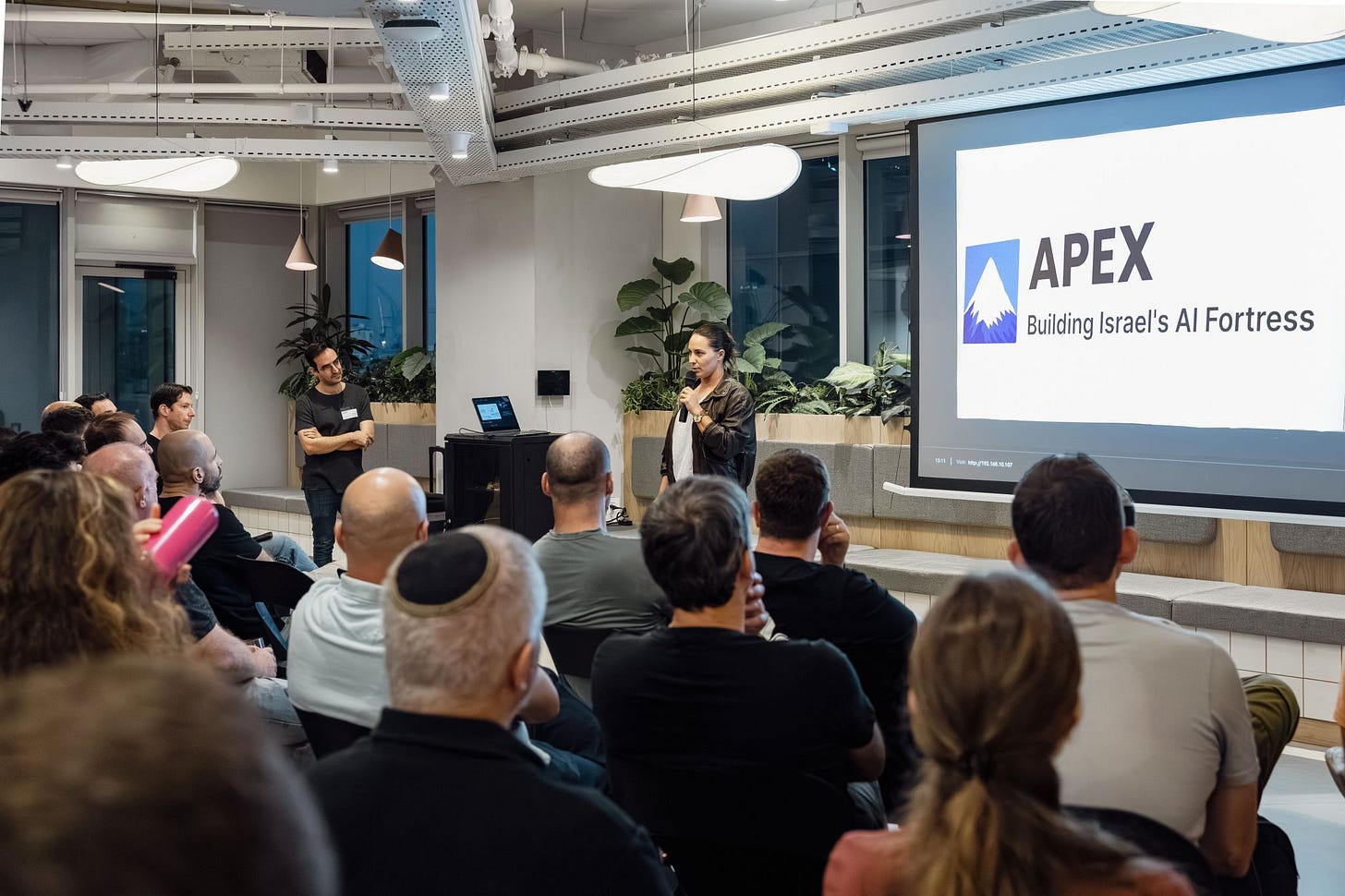Israel’s AI talent has nowhere to go
The country that pioneered cyber cannot build the infrastructure for artificial intelligence.
Welcome to Israel Tech Insider. I’m Amir Mizroch, a tech communications advisor and former EMEA Tech Editor at The Wall Street Journal. This newsletter is about connecting the dots to give you a sharp, insider’s take on what’s really going on in Israel’s tech economy. amir@israeltechinsider.com
Israel’s AI sovereignty is off to a late start
In a classroom in Tel Aviv, two dozen engineers, graduates of Israel’s most elite military units, are learning to build large language models from scratch. Not to fine-tune them or write clever prompts, but to construct transformers, attention mechanisms and gradient-descent algorithms in PyTorch. The Architect Track at APEX, a new private-sector training program, has recruited precisely the people who should be architecting a national AI capability: alumni of the country’s top military R&D programs like Talpiot and Psagot which takes exceptionally bright youth and turns them into little Tony Starks [[Iron Man]].
The curriculum is rigorous, the students exceptional. They would be prized employees or startup founders anywhere in the world. The problem is that Israel has built nowhere for them to work.
This is not for lack of raw capability. Israel ranks first globally in AI research citations per paper and first in AI patents per capita, according to data compiled by the Ministry of Innovation, Science and Technology. Yet it ranks 26th out of 83 countries in AI infrastructure readiness. 65th for operating environment. It has no national supercomputer. Under Biden-era export controls, still in force, Israel is capped at importing 50,000 high-end GPUs per year through 2027—an “economy class” allotment, as Nvidia’s local director put it. By contrast, the United Arab Emirates is negotiating for 500,000 chips annually. When Crown Prince Mohammed bin Salman and President Donald Trump convened Silicon Valley’s AI elite in Riyadh this spring to announce $600 billion in commitments, Israel was not invited. The reason wasn’t just political. When American and Gulf planners surveyed the Middle East for AI infrastructure, they found vast solar farms, natural gas plants, oil facilities, fast-tracked data-centre permits and sovereign-wealth backing in the Gulf states. In Israel they found talented individuals renting GPU time in Frankfurt.
Talent without infrastructure
The gap between human capital and physical capacity has opened a second time. Israel exports $10bn-worth of cybersecurity products and services annually—more per capita than anywhere on earth. It also suffers 3.5% of global cyber incidents despite representing 0.1% of the world’s population. Israeli hospitals are encrypted by ransomware gangs using credentials bought on Telegram for $50. Seventeen per cent of successful breaches exploit stolen passwords; another third exploit misconfigured access controls. Israeli firms manufacture the software systems that prevent 99% of these attacks. They export them worldwide. Domestic critical infrastructure, however, remains unprotected, because no ministry mandated their deployment at home.
The pattern is structural, not coincidental. Unit 8200 optimises for offensive capability and venture-backed exits—the high-margin work of finding software vulnerabilities and building exploits. No institution optimizes for the unglamorous operational discipline of mandatory two-factor authentication and quarterly access audits. Israel monetised cybersecurity expertise while exempting itself from cybersecurity hygiene. It became the world’s foremost cyber-arms dealer and simultaneous proof that technical brilliance without institutional discipline is expensive theatre. Now it is repeating the experiment with artificial intelligence.
If you build it, they will come
APEX was founded to solve what its architects, themselves alumni from the IDF’s elite tech units, call the “talent-to-capability conversion failure”. Elite engineers emerge from classified military units with deep technical skill but no defined pathway into civilian AI leadership. The innovation model that built Israel’s cybersecurity industry—secretive, hardware-light, optimized for tactical advantage—cannot scale to the compute-heavy, open-data requirements of foundational AI. Foundation models like ChatGPT, Claude, and Gemini need public datasets, international collaboration and energy infrastructure measured in gigawatts. The top-secret playbook produces brilliant point solutions and lucrative exits. It does not produce sovereign capability. The result is that raw talent dissipates into incremental software features or emigrates to California. APEX’s co-founder Avishag Bohbot describes the dynamic as “talent rising, position falling”—Israel’s global AI ranking declines even as its per-capita research output climbs.
The Architect Track teaches what military research-and-development does not: large language models from first principles, transformer architectures, model deployment at scale. The parallel Founder Track updates the commercialisation playbook for the AI era: term-sheet psychology, American market entry, investor narratives that translate defense instincts into venture credibility. Together, the tracks aim to function as what APEX calls “a national talent router”, converting technical density into deployable capability. The curriculum is serious, the cohort model effective and the network effects genuine. But will it be enough to stem Israel’s slide in global AI power?
What the state will not build
In August 2025 a national committee chaired by Yaakov Nagel, a former national security adviser, issued its (blunt) assessment. “Israel is not at the right point, and not even at the desirable trajectory,” it concluded. “Without swift and adequate action, the country will experience a further and rapid decline in its global status.” The report quantified the shortfall. Israel fields roughly 120 researchers working on core AI—foundation models, training infrastructure and fundamental algorithms. The University of California, Berkeley, alone has 70 working in comparable areas. The committee proposed a remedy: NIS 25bn ($6.6bn) over five years for a National AI Directorate with procurement authority modelled on America’s Defence Advanced Research Projects Agency (DARPA), 60,000 GPUs for academic use within 24 months, fast-tracked grid connections for data centres, a sovereign energy strategy and open government datasets with unified privacy frameworks. The budget amounts to 0.25% of GDP annually, less than cost overruns on Tel Aviv’s light-rail project.
The government’s response has been to appoint Almog Cohen, a member of the far-right Jewish Power party, as deputy minister for AI. Mr Cohen’s CV includes yeshiva education, militia leadership and pizza-parlour management. No AI credentials appear. His mandate is to shift Israel’s AI “centre of gravity” to the Negev and Galilee—a goal that collides with the fact that Israel’s electricity grid was designed for peacetime residential loads, not desert data centres requiring cooling systems in a water-scarce region and transmission upgrades tangled in bureaucratic approvals. No budget has been appropriated. No infrastructure plan exists. No compute strategy has been articulated. The distance between APEX’s human-capital production and state infrastructure investment now defines the paradox.
What’s at stake?
Israel’s technical contributions to global AI and semiconductors are not marginal. Amazon Web Services runs on chips designed by Annapurna Labs, an Israeli acquisition that AWS’s chief executive called “probably the most important moment in AWS history”. Microsoft’s Azure cloud security was architected by engineers who later founded Wiz, now the fastest-growing cybersecurity startup in history, acquired by Google for $32B. Apple’s Vision Pro spatial-computing headset relies substantially on Israeli-developed technologies. Nvidia is expanding its Israeli operations to absorb engineers Intel can no longer retain.
Yet there is a difference between being an AI power and being a component supplier. Powers set technical standards, anchor supply chains and seed next-generation infrastructure. Suppliers generate revenue but cede governance. Without sovereign compute, energy infrastructure and data frameworks, Israel defaults to supplier status. APEX graduates will still build important systems—on Amazon’s cloud, using datasets hosted in Dublin, within regulatory frameworks defined in Brussels, generating returns that flow to Seattle shareholders.
APEX puts it even more starkly: “AI is central to defense, the economy, intelligence, and global standing. Losing leadership means loss of sovereignty and security edge. Since October 7, ongoing isolation shows sovereignty is a must. The stakes are existential.”
They’re not wrong, as I explored in my post on the Israel-Iran 12 Day War.
AI v Ayatollah: The World’s First Data War
Hello subscribers, and apologies for not sending a newsletter last week. Life here became, shall we say, challenging. Already in a war for almost 2 years, we’re now in another one, toe to toe against the Ayatollah himself (the head of the snake, Octopus, nuclear duck—pick your evil spirit animal). It’s too early to tell which way this will go—fantastic …
Israel’s AI Snapshot
The failure mechanism is economic, not technological. AI capability rests on three non-substitutable inputs: talent, compute and data. Israel has invested exclusively in the first. Talent without compute forces researchers to lease cloud credits, embedding dependency into foreign-governed infrastructure. Compute without data means training on synthetic or foreign datasets, forfeiting advantages in domains where Israel is defensible—medical imaging, defense systems, multilingual natural-language processing for populations fluent in Hebrew, Arabic, Persian, Russian, Amharic and French. Data without talent leaves expensive infrastructure idle. Economists call this complementarity collapse: each input becomes less valuable when others are absent.
The UAE, meanwhile, has committed $100bn to sovereign AI infrastructure, including foundation models in Arabic. Saudi Arabia’s state-backed AI firm, Humain, is deploying 18,000 specialised Nvidia servers. The Gulf is fusing solar capacity, nuclear reactors and subsidised grid upgrades to create low-cost power for hyperscale GPU clusters. Fast-track permitting, cheap land and sovereign-wealth underwriting eliminate the bottlenecks—planning delays, energy tariffs, risk premiums—that slow deployment elsewhere. America’s AI giants committed $600bn in Riyadh not because Gulf states have superior researchers (they do not), but because electron-to-inference supply chains now matter more than ARXIV citations. The world’s focus has shifted from talent to transformers—the electrical substations, cooling plants and grid interconnects that deliver power at scale. Israel is still competing on the old metric while the race has moved.
The choice ahead
Israel now faces a binary decision. It can fund the infrastructure backbone—national compute grid, energy strategy, supercomputer access, data governance that allows startups to train on Israeli medical records and transportation telemetry under privacy-preserving frameworks. That converts APEX’s output into deployable sovereign capability. Or it can continue producing world-class engineers who scale models on Google Cloud Platform, train on ImageNet, deploy on AWS and generate returns that accrue to foreign balance sheets. The former requires the NIS 25bn and cross-ministerial coordination that successive Israeli governments have proved incapable of sustaining outside wartime. The latter requires accepting that “Startup Nation” has become a talent-export terminal with a flag.
The cybersecurity precedent suggests which outcome is more probable. Israel built the world’s most sophisticated offensive cyber capability, exported it profitably and exempted itself from the defensive discipline that capability implied. The result was not a failure of intelligence but a failure of the assumption that excellence obviates structure.
The broader lesson extends beyond one small country. AI capability is increasingly defined not by the smartness of individuals but by the density of physical infrastructure: chips, watts and fibre. Nations that treat AI as a software problem to be solved with talent and venture capital will find themselves supplying components to nations that treat it as an infrastructure problem requiring energy policy, grid upgrades and sovereign compute. Israel pioneered the former approach in cybersecurity and is now repeating it in AI, despite clear evidence that the model produces profitable companies but not strategic autonomy. APEX trains the infantry. The state must build the base.
Meanwhile, the gap is closing. Not because Israel is building faster—because everyone else is. The Gulf states are converting oil wealth into electron wealth at sovereign scale. The U.S. is integrating AI into defense procurement and grid planning. China is mandating AI deployment across industrial policy. Israel is appointing pizza parlor managers and hoping Unit 8200 alumni can bridge the distance with talent alone. The global AI race will not pause for Israel to reconcile the contradiction between the individual brilliance it celebrates and the institutional coordination it cannot get right.
The author advises technology companies on strategic communications and previously served as EMEA Technology Editor at The Wall Street Journal.





Does the Gulf have enough talent?
Excellent piece on an issue that I never see getting attention other than from you.